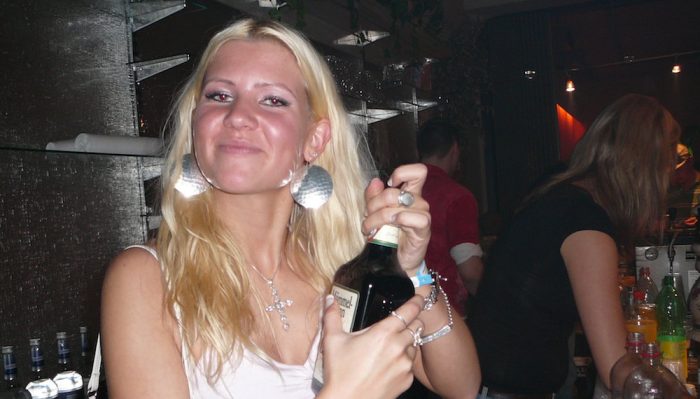I can’t pinpoint the moment I decided to become an extrovert.
But I do have a particularly strong memory from when I was around 15.
I was in the local park on a Friday night, a bottle of cider in hand and belting out Bon Jovi’s “Livin’ on a Prayer” at the top of my lungs. Other kids chorused behind me, clapping and urging me to go on. “So, this is how you do it,” I thought. A star was born.
My sensitive and quiet nature made me pale into the background as a teen. I wasn’t bullied—but I wasn’t noticed, either. Being an only child probably intensified feelings of isolation. To me, confidence and gregariousness was the norm—and people like me fell outside of that.
It was perverse, really: I wanted to have lots of friends while not really liking talking to people that much. It didn’t occur to my young mind that I was fine as I was. In fairness, my 31-year-old mind didn’t understand this either.
Finding alcohol—god, it was like the metamorphosis. Strongbow Cider was my portal to an alternate personality. A better one. When I drank enough (about 0.75 litres of cider in those days), I became the young lady I thought I should be—talkative, engaging, and sassy. Being pissed enabled me to solicit friendships with anyone. It initiated first snogs in the bushes, and it sponsored many sing songs in the street.
The local park soon turned into the pub. Here, I met brand-new people from other schools. This, of course, necessitated the need to drink even more. My logic? Quiet people don’t make friends.
Drinking alcohol was going so well for me that at 17, I took a unilateral decision on behalf of my family that I was old enough to get paralytic. My parents did not agree. To me, it didn’t matter. I was a grownup—underage or not.
I became known locally as “Steaming Kirsty.” When I consider how drunk everybody else was, the fact that I was singled out for this mantel is quite simply f*cking staggering. At the time, it was a compliment. It was an endorsement of my good work.
I loved it. I’d become the girl I was meant to be: loud, fun, wild.
It wasn’t until university that the cracks began to show. By night, I’d drink a bottle of vodka before reaching the bar and being everyone’s best pal. By day, I’d wee in my dorm room sink to avoid risking human contact by going to the toilet. I didn’t want to join the people in my halls of residence for film nights, casual drinks, or Tesco trips. In sobriety, I was much happier in my own company or in the occasional company of the few friends I made.
Back then, I put it down to the fact everyone was a “posh wanker” whom I had nothing in common with. This, in part, was true—but looking back, it’s also because I knew I wouldn’t have much to say sober.
On the rare occasions when I did join the group, I felt uncomfortable as hell. I felt like I couldn’t connect with them. I felt like a total weirdo.
So, my dorm room became my bunker where I rode out most of first year. And when I did make public appearances, it was only sloshed.
This went on for years, and for the most part, was a lot of fun. Alcohol made me the showgirl I’d always wanted to be. I’d do anything to get a laugh. Pee in the street. Lob my tits out. Be whatever caricature people wanted. I was Kirsty the Showgirl, and I felt like my “fans” loved me for it. I relished reliving the stories with friends the next day because it allowed me to cling to the persona.
I remember a friend saying to me in my 20s, “You’re a different person when you’re drunk.” I didn’t like this comment: Steaming Kirsty was who I wanted to be. What I didn’t realise then is that my friends understood I wasn’t a crazy party girl 24 hours a day. And they were fine with that.
Fast-forward to my early 30s, and I decided to have a break from the booze. I got made redundant, had a bout of depression, got better, and got a new job. I wanted to be my best, clear-headed self for it.
I want to say that this is the part where I realised that I was an amazing social animal, drunk or not. That’s absolutely not what happened.
What followed my abstinence was a solitary retreat into a prickly cave of self-loathing. I went to social events sober and hated them. I’d spend most of the night thinking how socially inept I was.
Now calmer and quieter, I believed people were seeing the real me: boring as hell. After years of dominating attention and holding court on nights out, I didn’t know what I was supposed to do. I thought I would lose friends. I thought acquaintances would shun me. I felt as if people would stop inviting me places and I’d just fade away.
I decided the solution was to become a more interesting human being. I also decided that I had some mental reconditioning to do. I clearly didn’t like social events sober, so I became obsessed with tackling this.
It didn’t occur to me that I don’t have to like small talk, crowds, and drunk people. No, I was convinced that I had a sickness that needed to be cured. This makes me laugh now.
The penny dropped when I read Susan Cain’s Quiet. Pretty much everything she writes about introversion resonated with me. It was game-changing, and I’m just sorry I didn’t read it until I was 32.
I’m clearly an introvert. The book taught me that it’s okay to need recharge time. It’s okay to dislike large groups. It’s okay to feel overwhelmed by people. It’s okay to want to fall through the floor when someone asks “What have you been up to?”
Now, I am much happier to go to social events, because I know that it’s okay for me to not always enjoy them. I know that it’s okay to prefer the periphery. I know it’s okay to not be the social butterfly. I do now drink alcohol again, but Kirsty the Showgirl—God bless her and the LOLs she gave—has made way for something more authentic. I now like to be in bed by 11 p.m.
Studies suggest that extroverts are more likely than introverts to binge drink alcohol. I was certainly an exception to this rule.
Alcohol was my ticket to becoming the extrovert I believed I should be. I can’t help wonder how many “extroverts” are out there doing the exact same thing.







Read 0 comments and reply